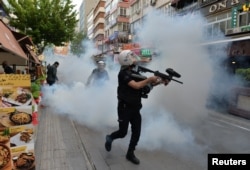International and national pressure is growing on Ankara over the fate of two protesters in the 76th day of a hunger strike. Teacher Semih Ozakca and Professor Nuriye Gulmen are fasting over the loss of their jobs as part of an ongoing nationwide government purge following July’s failed coup attempt.
The two hunger strikers were arrested early Monday and charged as members of a terrorist organization. Sixty two members of the European Parliament condemned their arrest in a letter to Turkish Justice Minister Bekir Bozdag, calling for their immediate release.
The letter also criticized the wider crackdown. “We, the undersigned members of the European Parliament, wish to express our deepest concern about the ongoing state of emergency and disproportionate effects thereof on democracy and human rights in Turkey,” the letter said.
Ozakca and Gulmen’s arrest prompted protests in several Turkish cities. In Ankara, police violently broke up a demonstration, arresting more than a dozen. Several opposition law makers attempted to hold a protest Wednesday, but were warned by police they would be arrested.
In Istanbul Tuesday, dozens of riot police backed by a water cannon truck prevented a protest before it started, warning all those attending would face arrest.
“We already know that you have destroyed justice. But it must be very hard, even for you, to be so remorseless as to arrest Gulmen and Ozakca. Rather than being arrested, they should be reinstated to their posts,” Kemal Kilicdaroglu leader of the main opposition Republican People’s Party, said in a Twitter post.
Teachers are growing rights symbol
The educators' hunger strike, under the banner “We Want our Job Back," has become a focal point of growing criticism over the ongoing purges. Protests in the teachers' support have spread across the country.
More than 140,000 people have lost their jobs in the crackdown. All dismissals are done by presidential decree under emergency rule powers introduced after July’s failed coup.
Sunday, President Recep Erdogan promised there would be no let up in the crackdown, indicating emergency rule will stay enforce indefinitely, until the return of “peace and prosperity.”
“Nobody can be fired from their jobs like this. We want to show that,” said Gulmen, before her arrest, “Our main demand is that we want the decrees to be annulled. We don't want a single laborer to be sacked with a decree ever again.”
Gulmen, visibly frail from her months of fasting in which she drank only water with sugar, acknowledged the dangers she and Ozakca are taking,
“Yes, we are under risk. Hunger strike is a protest that contains risks. Everybody knows that, and we were always aware of the risks. We are calling on everyone who is concerned and aware of the risks to solve the problem with those responsible,” said Gulmen.
Gulmen and Ozakca were both dismissed for being supporters of the Islamic cleric Fethullah Gulen, blamed for July’s failed coup. After their dismissal, they initially protested peacefully every day, frequently resulting in their arrest. Their daily routine of protest and detention went viral across social media, making them celebrities among opponents of the crackdown. With such efforts failing to get their jobs back, however, both went on a hunger strike.
Growing support for protests
Some opposition lawmakers have gone on token one-day hunger strikes, while others joined them in protesting.
“It is not because they prefer hunger, it is not because they want their health to deteriorate, it is not because they love death. They are doing this action because they want to keep their honor,” said opposition deputy Mithat Sancar, addressing a protest in Ankara. “Responsibility falls upon us, we must not to leave this resistance alone."
Prime Minister Binali Yildirim said he would look into their cases, although he insisted the hunger strike is unnecessary because there are official channels to challenge any dismissal. A government appointed seven-member panel,was set up last week for people to challenge their dismissals. But British based Human rights group Amnesty International dismissed the panel as woefully inadequate and without independence.
With the hunger strikers approach their third month of fasting, pressure on Ankara is predicted to grow. Human rights groups are looking to the European Union.
"The EU should put human rights firmly back into the picture,” said Lotte Leicht, of U.S. based Human Rights Watch. “Presidents Juncker and Tusk should convey the message that with Turkey’s EU accession stalled, deeper economic cooperation under a possible new customs union will depend on Erdogan ending the deplorable crackdown in Turkey, and taking steps to uphold human rights and the rule of law.”
Erdogan is to hold talks Thursday with European Union representatives on the sidelines of the NATO summit in Brussels.





